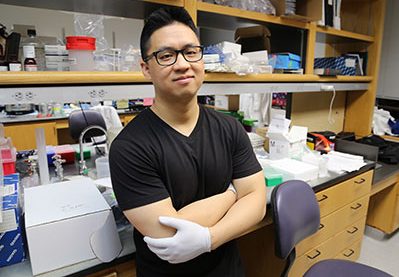Each month we introduce you to one of our fantastic team members. Meet Simon Chu, MD, MS, a Surgery Resident Research Fellow working with Tippi MacKenzie and Kyle Cromer to improve therapies to treat genetic diseases before birth.

Q. Tell us about yourself.
A. I study a hemoglobinopathy known as alpha thalassemia major, caused by a genetic variant affecting alpha-globin’s production—a necessary part of normal hemoglobin. In the MacKenzie lab, I investigate whether the fetal immune system is responsive against maternal alloantigens after a maternal in utero stem cell transplant. To do this, I use an in vitro mixed lymphocyte reaction to measure proliferative responses in CD4+ and CD8+ fetal T cells after exposure to maternal antigen-presenting cells. In the Cromer lab, I use a CRISPR/AAV platform to perform ex vivo gene editing of patient cells with alpha thalassemia major to restore a functional copy of an alpha-globin gene. I hope these studies will directly translate into therapies for patients with alpha thalassemia and further our ability to treat other genetic diseases in utero.
We need more surgeon scientists to tackle the problems our patients face and to innovate and bring new therapies to the clinic.
Simon Chu, MD, MS
Q. Why is it important to you?
A. We need more surgeon scientists to tackle the problems our patients face and to innovate and bring new therapies to the clinic. As physicians, we are often limited by the existing tools we have to treat conditions. By combining our knowledge of human disease and technical and scientific training, we can change the outcomes of devastating genetic conditions and create a world where more children are born healthy.
Importance To Community
Q. Why do you think it’s important to people/communities?
A. Alpha thalassemia major primarily affects individuals whose ancestry traces to Southeast Asia and Southern China, where my family is from. It is important to think critically about how to bring the treatments we discover in the lab to the communities that need them the most.
Alpha thalassemia major was once a disease that was almost universally fatal. The ability to treat fetuses with this condition before birth—with in utero blood transfusions—and to one day provide a cure for this condition can provide tremendous hope to families and communities. At the same time, an equal part of our responsibility as physicians and scientists is to work with these communities so they are partners in creating and disseminating these therapies.
Did You Know?
Q. Finally, what’s a fun/interesting/surprising fact about you?
A. The first time I set foot in a basic science lab was in high school as part of a six-week Upward Bound pre-college program—I still remember how big I thought the -80C freezers were! I am first-generation Asian-American and first-generation to college. I think it’s tremendously important to bring science and medicine to high school students from underserved communities.





